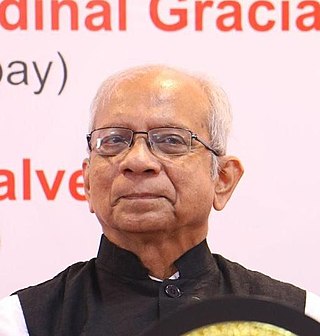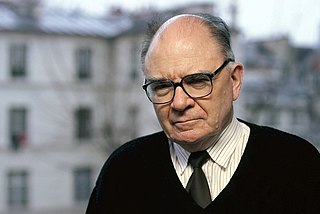
The Society of Jesus, also known as the Jesuit Order or the Jesuits, is a religious order of clerics regular of pontifical right for men in the Catholic Church headquartered in Rome. It was founded in 1540 by Ignatius of Loyola and six companions, with the approval of Pope Paul III. The society is engaged in evangelization and apostolic ministry in 112 nations. Jesuits work in education, research, and cultural pursuits. Jesuits also conduct retreats, minister in hospitals and parishes, sponsor direct social and humanitarian ministries, and promote ecumenical dialogue.
The United Nations High Commissioner for Refugees (UNHCR) is a United Nations agency mandated to aid and protect refugees, forcibly displaced communities, and stateless people, and to assist in their voluntary repatriation, local integration or resettlement to a third country. It is headquartered in Geneva, Switzerland, with over 18,879 staff working in 138 countries as of 2020.

An internally displaced person (IDP) is someone who is forced to leave their home but who remains within their country's borders. They are often referred to as refugees, although they do not fall within the legal definitions of a refugee.

Pedro Arrupe Gondra, SJ was a Spanish Basque priest who served as the 28th Superior General of the Society of Jesus from 1965 to 1983. He has been called a second founder of the Society, as he led the Jesuits in the implementation of the Second Vatican Council, especially with regard to faith that does justice and preferential option for the poor.

The superior general of the Society of Jesus is the leader of the Society of Jesus, the Catholic religious order also known as the Jesuits. He is generally addressed as Father General. The position sometimes carries the nickname of the Black Pope, because of his responsibility for the largest male religious order, in contrast with the white garb of the pope. The thirty-first and current superior general is Fr Arturo Sosa, elected by the 36th General Congregation on 14 October 2016.

Peter Hans Kolvenbach was a Dutch Jesuit priest and professor who was the 29th superior general of the Society of Jesus, the largest male Catholic religious order.

The General Congregation is an assembly of the Jesuit representatives from all parts of the world, and serves as the highest authority in the Society of Jesus. A General Congregation (GC) is always summoned on the death or resignation of the administrative head of the order, called the Superior General or Father General, to choose his successor, and it may be called at other times if circumstances warrant. A smaller congregation of worldwide representatives meets every three years to discuss internal business and to decide the need for a general congregation.
Mark Raper SJ AM is a Jesuit priest. He currently serves as president of the Jesuit Conference of Asia Pacific, based in Manila. He was previously provincial superior of the Society of Jesus in Oceania from 2002 until 2008.
The Norwegian Refugee Council is a humanitarian, non-governmental organisation that protects the rights of people affected by displacement. This includes refugees and internally displaced persons who are forced to flee their homes as a result of conflict, human rights violations and acute violence, as well as climate change and natural disasters.

Cedric Prakash,, is a Catholic priest and a member of the Society of Jesus (Jesuits) of Gujarat in India. He is currently based in the city of Ahmedabad, Gujarat in Western India. He is well known for his work on human rights, reconciliation, and peace activism, with a focus on advocacy. He is also a prolific writer on subjects related to social justice, peace, communal harmony, environment, contextual spirituality, and the Constitution of India. His articles are regularly published in newspapers, magazines, and journals in India and abroad. He is also a visiting faculty in some colleges, universities, and seminaries in India, Europe, and the USA. Fr. Prakash speaks four languages - English, Gujarati, Hindi and French.

Adolfo Nicolás Pachón was a Spanish Jesuit priest of the Catholic Church. He was the 30th Superior General of the Society of Jesus from 2008 to 2016. Before being elected Superior General, he worked primarily in Japan; he taught at Sophia University in Tokyo for twenty years and then headed educational institutions in Manila from 1978 to 1984 and in Tokyo from 1991 to 1993. He led the Jesuits in Japan from 1993 to 1996 and, after four years of pastoral work in Tokyo, led the Jesuits in Asia from 2004 to 2008.
Paolo Dezza, S.J. was an Italian Jesuit cardinal who led the Pontifical Gregorian University during the pontificate of Pope Pius XII, whom he aided in the preparation of the dogma of the Assumption of Mary. He was confessor to Pope Paul VI and Paul's successor, Pope John Paul I, and was a teacher of Pope John Paul I's successor, Pope John Paul II.
Sudanese refugees are persons originating from the country of Sudan, but seeking refuge outside the borders of their native country. In recent history, Sudan has been the stage for prolonged conflicts and civil wars, as well as environmental changes, namely desertification. These forces have resulted not only in violence and famine but also the forced migration of large numbers of the Sudanese population, both inside and outside the country's borders. Given the expansive geographic territory of Sudan, and the regional and ethnic tensions and conflicts, much of the forced migration in Sudan has been internal. Yet, these populations are not immune to similar issues that typically accompany refugeedom, including economic hardship and providing themselves and their families with sustenance and basic needs. With the creation of a South Sudanese state, questions surrounding southern Sudanese IDPs may become questions of South Sudanese refugees.

Jean-Yves Calvez was a French Jesuit, theologian, philosopher, economist, expert in Marxism and professor of social philosophy.

Centre justice et foi, abbreviated to CJF, is a centre for social analysis in Montreal. It was founded by the Society of Jesus in 1983 and publishes the magazine Relation. It is situated on the corner of Saint Laurent Boulevard and Jarry Street opposite Jarry Park.
Giuseppe Pittau was a Roman Catholic titular archbishop.
A refugee crisis can refer to difficulties and dangerous situations in the reception of large groups of forcibly displaced persons. These could be either internally displaced, refugees, asylum seekers or any other huge groups of migrants.

Arturo Marcelino Sosa Abascal is a Venezuelan Catholic priest who serves as the 31st and present superior general of the Society of Jesus. He was elected by the Society's 36th General Congregation on 14 October 2016, succeeding Adolfo Nicolás. He is the first person born in Latin America to lead the Jesuits.
The Migrants and Refugees Section is a section on migrants and refugees included in the Vatican Dicastery for Promoting Integral Human Development (IHD).
United Nations General Assembly Resolution 48/144 of 20 December 1993 is a resolution in which the General Assembly expressed its concern at the ongoing degradation of the humanitarian situation in Azerbaijan because of the displacement of considerable number of citizens due to Nagorno Karabakh conflict and supporting "emergency international assistance to refugees and displaced persons in Azerbaijan". The resolution is titled “48/114. Emergency international assistance to refugees and displaced persons in Azerbaijan”. It became the fifth United Nations document concerning Nagorno-Karabakh and the first United Nations General Assembly document on humanitarian aid to those affected by this conflict. This resolution was the first international document affirming the number of refugees and displaced persons in Azerbaijan exceeded one million. The document does not make any specific reference to previous UN resolutions on the ongoing conflict, but "its relevant resolutions regarding humanitarian assistance to refugees and displaced persons". The resolution was adopted by consensus without voting.










